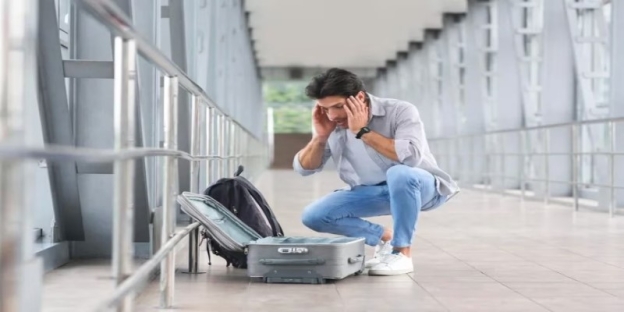What Should You Do If You Lose Your Passport Abroad?
Have you ever imagined what it would feel like to lose your passport in a foreign country? The sudden rush of anxiety, and the frantic pocket-checking - it can throw your entire trip off balance.
The truth is that thousands of travellers lose their passports every year, and most of them manage to return home safely without significant issues. The key is knowing exactly what to do, who to contact, and how to stay calm. Let’s break it down and help you take back control of the situation.
Stay Calm And Double-Check Everything
Before jumping to conclusions, take a deep breath and pause for a moment. Your passport might not be lost—it could be misplaced. Reflect on the last time you used it. Was it at the airport? At your hotel check-in? At a tour kiosk?

Now go through all your belongings slowly and thoroughly. Look in every pocket, pouch, book, and hidden zip of your backpack or suitcase. If you're staying at a hotel or hostel, please check with the reception desk. Sometimes, travellers leave their passports at the front desk for safekeeping and forget. Still nothing? Then it's time to act.
Report The Loss To Local Authorities
Once you're sure your passport is gone, your first step is to report it to the local police. Even if they don't recover it, getting an official police report is essential. You'll need that report for your embassy or consulate to issue a replacement.
Find the nearest police station—most hotel staff or locals can help you locate one. Be prepared to provide details such as the last time and place you saw your passport, your nationality, and your travel itinerary.
Don’t worry if there’s a language barrier. Translation apps or printed copies of key phrases can go a long way in these moments.
Contact Your Embassy Or Consulate
Next, contact your country's embassy or consulate. They are your go-to support system when something like this happens abroad.
If you don't know where the nearest one is, a quick online search using your phone should help locate it. Most embassies have emergency contact numbers specifically for passport-related situations.
Once you're in touch, they'll guide you through the process of applying for an emergency travel document or a replacement passport. Depending on where you are and how soon you'll be travelling again, they'll recommend the right option.
Prepare The Documents You’ll Need
To get a new passport, you'll need to gather a few essential documents. Here's what you should try to have on hand:
- A police report of the loss
- A passport photo (some embassies offer on-site photo services)
- Proof of identity (a photocopy of your lost passport, if available, or another form of ID like a driver's license)
- Proof of travel plans (flight bookings or itinerary)
- A completed passport application form (often available on the embassy's website or at the location itself)
If you're short on some of these, don't worry. Embassies understand that losing a passport can be a chaotic experience. They'll usually work with you to find alternatives.
How Long Will It Take To Get A Replacement?
The timeline can vary depending on your location. In major cities or countries with strong diplomatic infrastructure, it could be a matter of a couple of days. In remote or high-traffic areas, it might take longer.
If you’re nearing the end of your trip, many embassies can issue an emergency travel document. This is a temporary passport-like paper that allows you to fly back home or continue your journey to a limited number of countries.
If you're staying in one place for a while and need a complete passport replacement, the process might involve additional paperwork and a longer wait. Either way, your embassy will guide you through the specifics.
Keep Friends Or Family In The Loop
Even if you're handling everything well, it’s smart to let someone back home know what’s going on. A quick message or call to a family member or close friend not only reassures them but could help if you need them to email you copies of documents or assist with online bookings.
Additionally, if you have a travel insurance plan, now is the time to verify if your coverage includes expenses for replacing a lost passport—you can use it for reimbursement of fees, transportation costs to the embassy, or passport photos.
Be Cautious About Scams
Unfortunately, losing a passport can make travellers vulnerable. Be cautious if strangers approach you offering help, especially if they claim to have connections to the embassy or promise to speed up the process for a fee.

Always deal directly with official staff and representatives. Avoid sharing personal information with anyone not affiliated with law enforcement or your embassy.
Take Preventative Measures For The Future
This experience, while stressful, can teach you valuable lessons for future trips. Here are some ways to avoid passport troubles the next time around:
Keep Digital And Physical Copies
Before you travel, scan your passport and save it securely in cloud storage or on your phone. Print out a few copies as well.
Use A Hotel Safe Or a Hidden Pouch
Don't carry your passport around unless necessary. Use a hotel safe, a money belt, or a pouch that stays hidden under your clothes.
Register With Your Embassy (Optional)
Some countries allow travellers to register their trips online. If something goes wrong, the embassy can assist you more quickly.
Don’t Keep All Important Items Together
Spread out your cards, cash, and IDs in different locations. That way, if you lose one bag or wallet, not everything is gone.
Navigating Travel With Confidence
Handling a lost passport isn't about luck—it's about being prepared and informed. Whether you're backpacking across Europe or enjoying a beach holiday in Southeast Asia, staying calm and knowing the proper steps can turn a minor crisis into just another experience on the road.
So if you ever find yourself in this situation, remember: It's manageable. Embassies are there to help. And with a little organisation and quick thinking, you'll be back on track in no time.